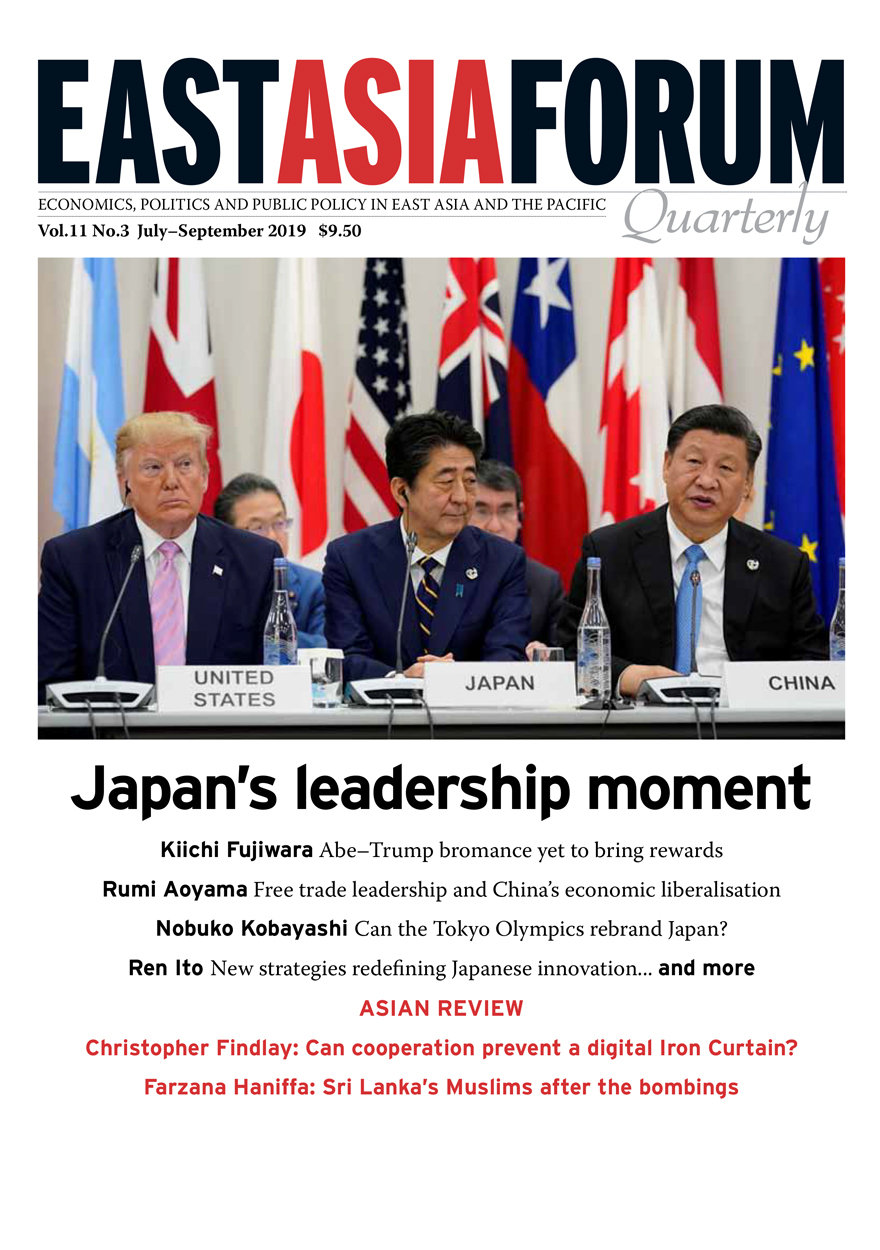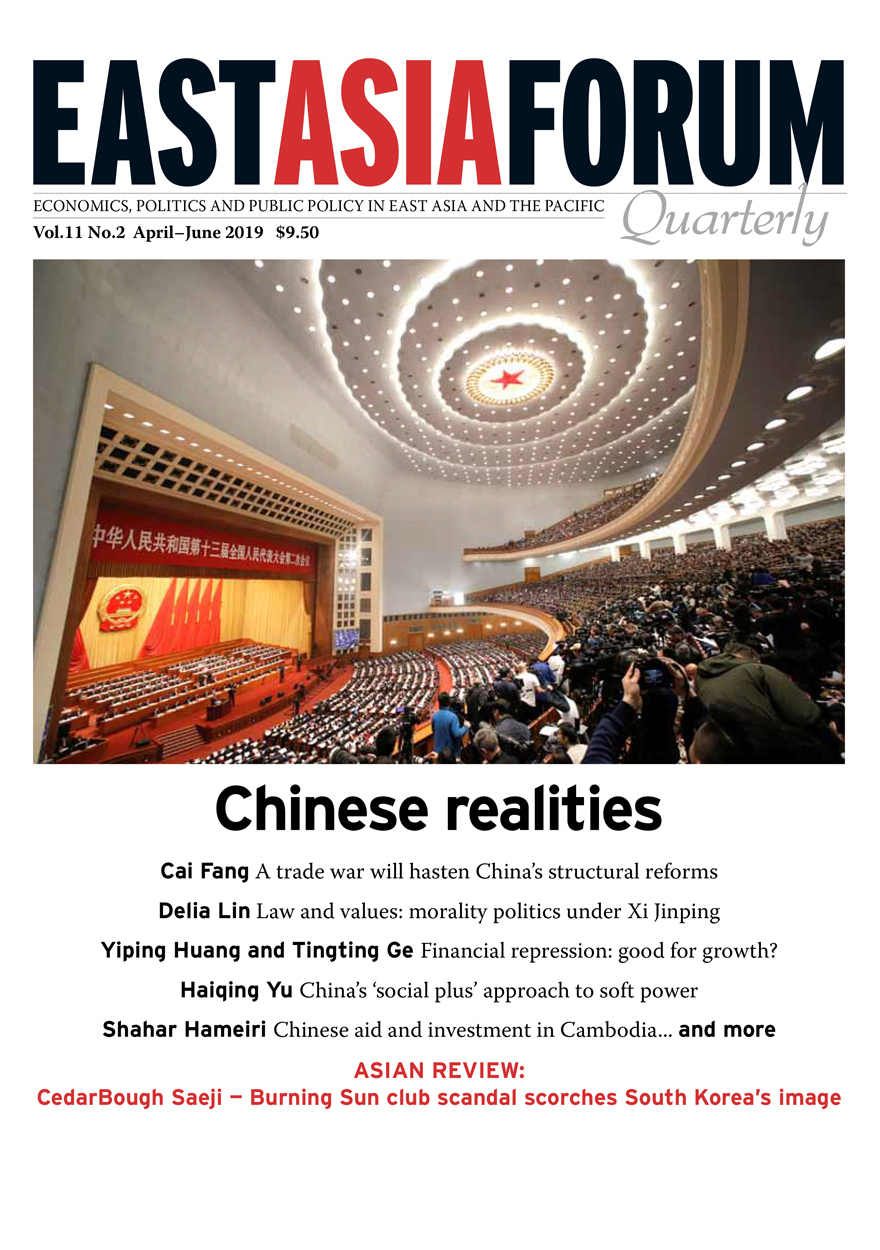Search titles
Displaying results 21 to 30 of 81.

East Asia Forum Quarterly: Volume 13, Number 2, 2021 »
Publication date: April 2021
Heightened geopolitical rivalry and the pushback against globalisation have challenged the multilateral trading system in Asia and globally. This East Asia Forum Quarterly examines how the region is navigating the new trade landscape through the COVID pandemic. For Asia, fixing a broken WTO is top priority. The resilience of supply chains, the foreign investment environment, international economic coercion, the digital economic revolution, and the emergence of a new multipolar are other issues put under scrutiny in this issue.
Download for free
Not available for purchase

East Asia Forum Quarterly: Volume 13, Number 1, 2021 »
Publication date: March 2021
Few American administrations in living memory face as arduous a set of domestic and external policy challenges as that led by President Joseph R. Biden. What faces the new team in Washington is nothing short of herculean: arrest the scourge of COVID-19, grow the economy and begin once more to address the historic grievances of racial injustice and socioeconomic inequality. How it handles those tasks will profoundly affect its capacity to prosecute an effective foreign policy.
This issue of the Quarterly explores the monumental foreign policy challenges in Asia that await the Biden administration. Our contributors ponder the fate of the US–China trade war, the limits to achieving an ambitious national climate policy, the ongoing challenges on the Korean peninsula, in South and Southeast Asia, and the likely financial constraints on a more forward-leaning US military posture.
Download for free
Not available for purchase

East Asia Forum Quarterly: Volume 12, Number 4, 2020 »
Publication date: December 2020
COVID-19 has spotlighted, like no other event, the importance of the ascendance of China in global affairs. This issue of East Asia Forum Quarterly examines how China is changing and why that is important. Contributors offer perspectives on China's economic transformation and the evolution of the political, military, technological, environmental and strategic dimensions of China under President Xi Jinping. The Asian Review discusses the future of Kashmir, human rights in Southeast Asia and global governance reform.
Download for free
Not available for purchase

Interpreting Myanmar »
A Decade of Analysis
Authored by: Andrew Selth
Publication date: December 2020
Since the abortive 1988 pro-democracy uprising, Myanmar (formerly Burma) has attracted increased attention from a wide range of observers. Yet, despite all the statements, publications and documentary films made about the country over the past 32 years, it is still little known and poorly understood. It remains the subject of many myths, mysteries and misconceptions. Between 2008 and 2019, Andrew Selth clarified and explained contemporary developments in Myanmar on the Lowy Institute’s internationally acclaimed blog, The Interpreter. This collection of his 97 articles provides a fascinating and informative record of that critical period, and helps to explain many issues that remain relevant today.

East Asia Forum Quarterly: Volume 12, Number 3, 2020 »
Publication date: September 2020
Japan's choices will be consequential — potentially pivotal — as the world moves through an inflection point in history. The United states and China are locking into strategic rivalry, with both countries dealing poorly with transition to a more multipolar order. How the rest of the world responds will determine global security, prosperity and stability for decades to come.
This issue examines how Japan will navigate the policy challenges associated with a post-COVID and post-Abe world. Our contributors offer a variety of perspectives on Japan’s global leadership role, domestic politics, health governance, diplomatic strategy and economic recovery. Our Asian Review pieces examine the domestic drivers of India’s foreign policy and the shaping of politics in China.
Download for free
Not available for purchase

East Asia Forum Quarterly: Volume 12, Number 2, 2020 »
Publication date: June 2020
How can Asia deal with the triple crises—health, economic and financial—of COVID-19? This issue of East Asia Forum Quarterly focuses on Asia's response.
This Quarterly features an important strategy paper by over a dozen distinguished experts that details a compact for cooperation among Asian countries for managing the immediate impact of the crises, plan for a speedy exit from the economic damage and protect against similar catastrophes in the future.
Our contributors offer a variety of perspectives on Asia’s role in mobilising international cooperation that is needed to deal with the triple crises of COVID-19. Instead of accentuating differences and retreating from openness, the lessons of past crises point to a need to realise the common interest in immunising Asia from a great depression.
Download for free
Not available for purchase

East Asia Forum Quarterly: Volume 12, Number 1, 2020 »
Publication date: March 2020
The changing geopolitical context compels middle powers to act. Countries have responded by forming explicit alliances, building upon hedging strategies or altering their leanings from one great power to another. The need for collective action is more urgent than ever to deal with emerging regional and global challenges.
This issue of East Asia Forum Quarterly looks at middle powers and the range of priorities they have. Some are focused on their domestic priorities while others are more eager to shape the political, economic and security dimensions in the region. Our contributors offer a variety of perspectives on the challenges that middle powers face and identify the call of middle-power vision in defending the rules-based order.
EAFQ 12.1 is dedicated to Aileen S.P. Baviera, founding president of Asia Pacific Pathways to Progress, who died on 21 March 2020, from pneumonia related to COVID-19.
East Asia Forum Quarterly grew out of East Asia Forum (EAF) online, which has developed a reputation for providing a platform for the best in Asian analysis, research and policy comment on the Asia Pacific region in world affairs. EAFQ aims to provide a further window onto research in the leading research institutes in Asia and to provide expert comment on current developments within the region. The East Asia Forum Quarterly, like East Asia Forum online, is an initiative of the East Asia Forum (EAF) and its host organisation, the East Asian Bureau of Economic Research (EABER) in the Crawford School of Economics and Government in the College of Asia & the Pacific at The Australian National University.
Download for free
Not available for purchase

East Asia Forum Quarterly: Volume 11, Number 4, 2019 »
Publication date: November 2019
The idea that countries can pursue prosperity and security as separate streams of the national interest has passed. Economics and security have always been enmeshed, although we assumed otherwise. The nature of the relationship between the two is changing fast. The narratives that surround the change find it difficult to keep up with the facts.
The world has become more multipolar, with remarkable growth outside the established powers in the North Atlantic. And big countries—not just the United States and China, but other G20 members like Brazil, Turkey, Russia and the United Kingdom—have become more nationalist and brazen in asserting what they perceive to be their economic and security interests over those of others. The US–China relationship is increasingly characterised by strategic competition in both the economic and security domains.
At the same time, digital technology has not just transformed products, firms and markets, it has opened them to cyber disruption and attack, resulting in a cross-over of security into the economic and social domains.
This issue of the East Asia Forum Quarterly explores what is happening, why and how to respond to the change. These essays argue for careful thought and active engagement by governments, business and the broader community. Genuine dialogue and problem-solving between the economic and security parts of universities and government is a good first step to frame the problem broadly, keep perspective and find solutions.
East Asia Forum Quarterly grew out of East Asia Forum (EAF) online, which has developed a reputation for providing a platform for the best in Asian analysis, research and policy comment on the Asia Pacific region in world affairs. EAFQ aims to provide a further window onto research in the leading research institutes in Asia, and to provide expert comment on current developments within the region. East Asia Forum Quarterly, like East Asia Forum online, is an initiative of the East Asia Forum and its host organisation, the East Asian Bureau of Economic Research in the Crawford School of Economics and Government in the College of Asia & the Pacific at The Australian National University.
Download for free
Not available for purchase

East Asia Forum Quarterly: Volume 11, Number 3, 2019 »
Publication date: August 2019
When Shinzo Abe was given a second chance at the Japanese prime ministership in 2012, Japan was in the throes of a period of intense domestic turmoil. After six prime ministers in six years, the nation was in desperate need of political stability. Abe has not only delivered that but is now set to become the longest-serving prime minister in modern Japanese history.
Abe commenced his second term with an ambitious policy program focused on reinvigorating the nation’s stagnant economy, amending the constitution to achieve a more ‘normal’ defence and security policy, and engaging proactively in regional and global affairs.
To what extent has Abe achieved these policy goals? How has he utilised the immense political capital accrued throughout his leadership tenure? And what will be the legacy that Abe leaves when his prime ministership ultimately comes to an end? In this issue of East Asia Forum Quarterly, scholars from both inside and outside Japan grapple with these questions.
East Asia Forum Quarterly grew out of East Asia Forum (EAF) online, which has developed a reputation for providing a platform for the best in Asian analysis, research and policy comment on the Asia Pacific region in world affairs. EAFQ aims to provide a further window onto research in the leading research institutes in Asia and to provide expert comment on current developments within the region. The East Asia Forum Quarterly, like East Asia Forum online, is an initiative of the East Asia Forum (EAF) and its host organisation, the East Asian Bureau of Economic Research (EABER) in the Crawford School of Economics and Government in the College of Asia & the Pacific at The Australian National University.
Download for free
Not available for purchase

East Asia Forum Quarterly: Volume 11, Number 2, 2019 »
Publication date: June 2019
The global debate on China is becoming more polarised. Is the Chinese economy robust or on the brink of collapse? Does the concentration of power in the hands of President Xi reflect a weaker or more confident China? Is the Belt and Road Initiative a platform for improving global infrastructure, or a strategy to make developing countries more dependent on China? And is Beijing succeeding in its overseas influence campaign, or has China’s global influence diminished in the face of a backlash?In this special issue of East Asia Forum Quarterly, experts from within and outside China force us to confront the complicated, evolving, and often contradictory forces shaping Chinese society, politics, economics and global affairs.
East Asia Forum Quarterly grew out of East Asia Forum (EAF) online, which has developed a reputation for providing a platform for the best in Asian analysis, research and policy comment on the Asia Pacific region in world affairs. EAFQ aims to provide a further window onto research in the leading research institutes in Asia and to provide expert comment on current developments within the region. The East Asia Forum Quarterly, like East Asia Forum online, is an initiative of the East Asia Forum (EAF) and its host organisation, the East Asian Bureau of Economic Research (EABER) in the Crawford School of Economics and Government in the College of Asia & the Pacific at The Australian National University.
Download for free
Not available for purchase



